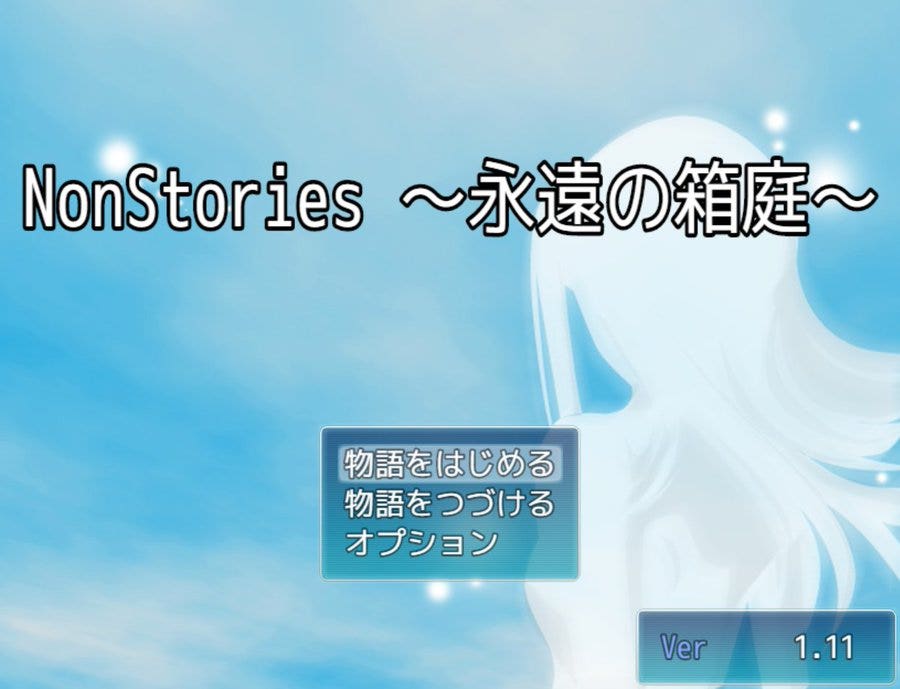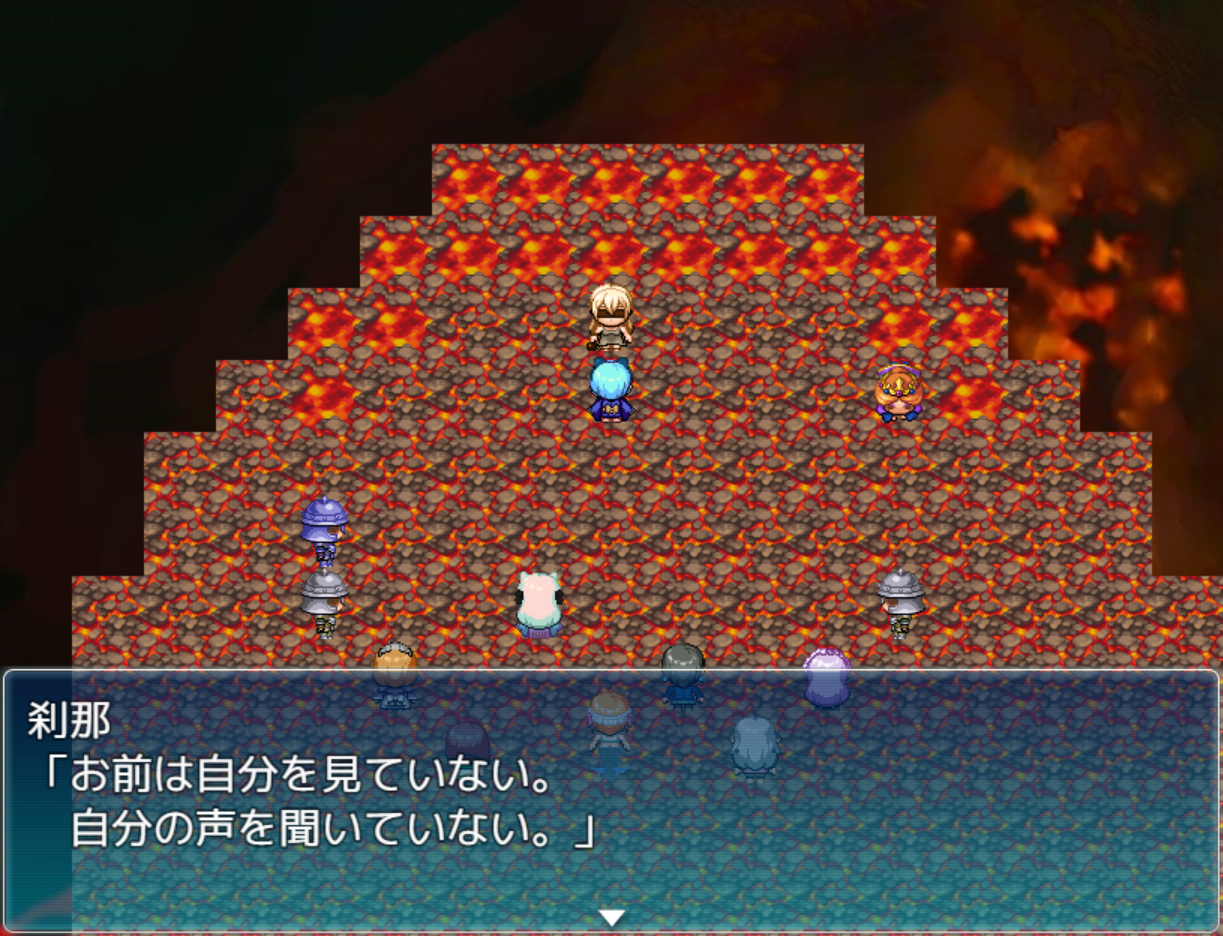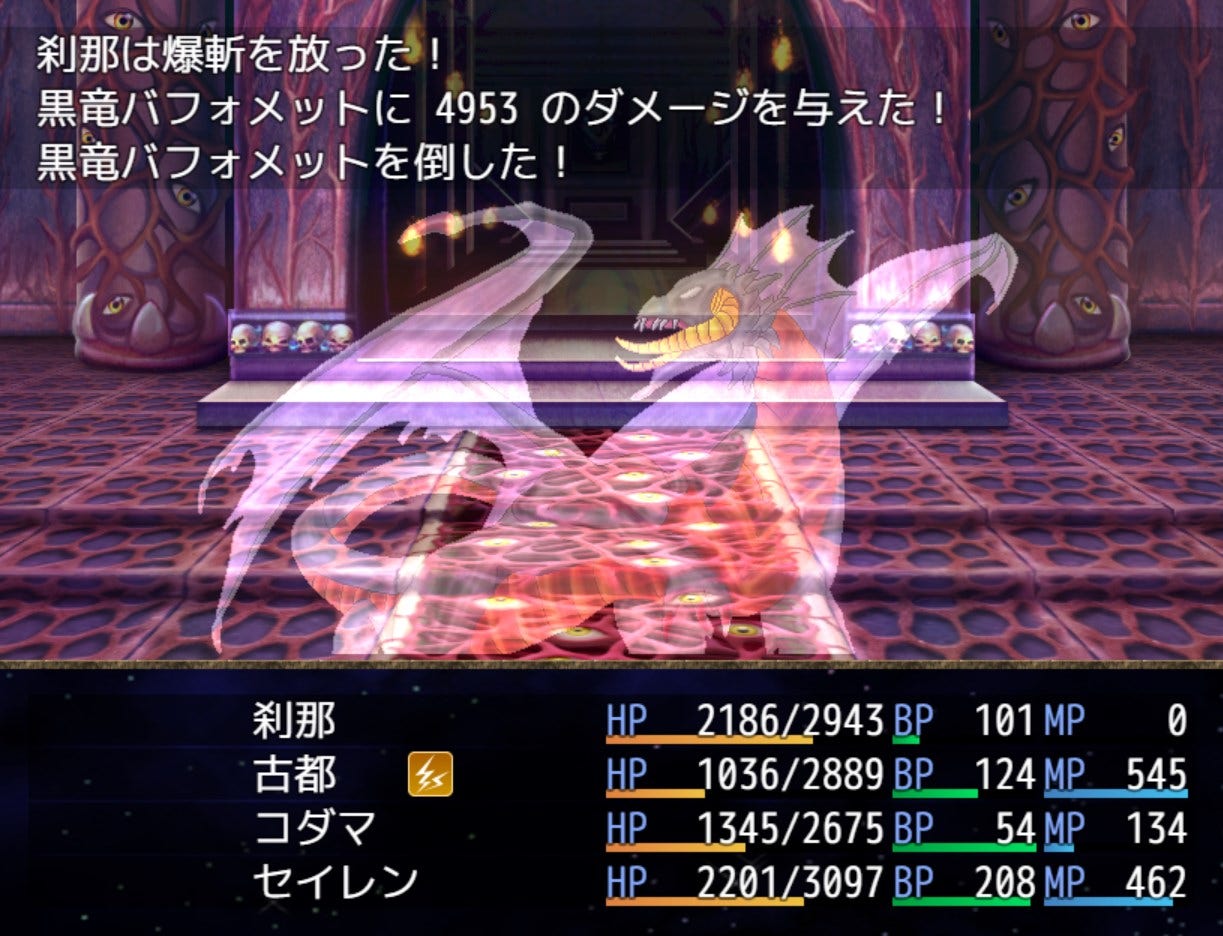A Nonstories Non Analysis
22 3月 2024

NonStories is a 110 hour roleplaying game about roleplaying game narratives.
Setting the Stage
NonStories takes place in a fantasy world where a human kingdom stands alone in a continent full of monsters and demons. Adventurers seek glory and treasure through doors to other worlds while politicians rot in their seats, ignoring the suffering of the lower classes and believing that might makes right. Magic seems to exist but only in limited quantities and to specific people. Everyone has to depend on themselves in this cutthroat life, and that seems to be the only narrative people can lead.
Our protagonist is Seiji (聖二) who lives by this code. His greatest strength is also his greatest weakness: he cannot go beyond his pragmatism. He and his childhood friend Shizuku (雫) work odd jobs for the Siegfried family who are invested in the efforts of a weak but noble liberation army trying to defeat the local mob group, the Thousand. Although Seiji knows that he would be directly affected by the outcome, he is most interested in getting his money's worth. After all, heroism doesn't pay the bills.
However, this all changed when he encountered the assassin Angetsu (闇月) who gained a deadly interest in Shizuku. He becomes aware of his vulnerability, the fact that he might lose someone he treasures, and more. Seiji wants to climb the social ladder, so he can get Shizuku to safety. He cannot rest until he knows Angetsu and her higher-ups, the Renmei (連盟), are nowhere near her.
This is a story of everyday people fighting against the power elite. A tale where the good nobles side with the lower class against the dying power brokers clinging to their power. A narrative that the good wins against evil.
It's not the story NonStories wants to tell.
Setting the Stage, Again
NonStories takes place in a fantasy world where a human kingdom stands alone in a continent full of monsters and demons. Adventurers seek glory and treasure through doors to other worlds while politicians rot in their seats, ignoring the suffering of the lower classes and believing that might makes right. Magic seems to exist but only in limited quantities and to specific people. Everyone has to depend on themselves in this cutthroat life, and that seems to be the only narrative people can lead.
But our protagonist, Setsuna (刹那), isn't interested in following the status quo. When she hears someone calling for help, she wants to be there to listen. She doesn't know everything -- all her knowledge comes from the books she happens to have read -- but she will beat up evildoers and gods to save people. Koto (古都), an agent related to the Renmei, is annoyed that Setsuna is an uncompromising Samaritan who cares little for herself. In fact, she shouldn't be alive in this dog-eat-dog society. Setsuna is so much of an anomaly that the world notices her and begins to threaten her safety.
But she helps the poor and needy because the world is full of weak, weak people. People are drawn to her because she accepts people, monsters, and more without judgment. It's hard to know if she does it out of compassion or empathy; she seems to view helping the needy as a duty and nothing else. Nevertheless, her actions attract people and demihumans to join her party against the forces of evil.
This is a story of heroes who risked their lives to save mankind from destruction. A tale of adventure and bravery. A narrative of good overcoming evil.
It's not the story NonStories wants to tell.
Setting the Stage, Again and Again...
NonStories takes place in a fantasy world where a human kingdom stands alone in a continent full of monsters and demons...
What is the Story of NonStories?
Describing NonStories is like describing an obsession with storytelling: there are infinite possibilities in storytelling, but the plausibility of rare events like deus ex machina endings is so minuscule that it often feels pointless to bring it up -- and yet we fight against it, wanting to see those rare and perfect happy endings. The inner critic in all of us wants fair, challenging stories, but its real guilty pleasure is looking for a story that cheats the rules of storytelling and gives every character we love a wonderful, utopian ending.
This paradox is explored in NonStories and its predecessor, UnExist. Both games scoff at the niceties of conventional video game storytelling as a limitation on the infinite possibilities out there in order to tell an interesting narrative. These games want a way out, but what would that exit look like?
In the case of NonStories, the game builds a vibrant world full of different factions, teams, and alliances to explore the many stories everyone leads. Whenever you start a new turn, you can choose from a list of different missions. Your characters can use physical or magical attacks, but both types consume a currency (BP for the former, MP for the latter) that can only be replenished through expensive items or by landing on certain tiles. Let's not forget that higher-tier magic can be interrupted by physical attacks (this applies to you and the enemies). Hence, the longer the mission, the harder the gameplay becomes as each simple encounter adds up.

The game is really a series of long wars of attrition for the player. I've lost many hours to the game because I simply lost concentration and allowed the enemies to destroy my fully equipped party. But in those moments of gameplay, I was pretty much in sync with what the party was feeling. Whenever there is a cutscene where the party is exhausted after long treks and boss rushes, I can feel it. Rather than approaching difficulty as the developer challenging the player's wits, the difficult parts of the game result from the story reacting to the characters' actions.
As you read the lore and immerse yourself in the politics, you eventually realize that you are brushing up against the story of NonStories (and for that matter, Unexist). Characters comment on events like film critics; they don't believe that stories will turn out like some Dragon Quest game, even if they notice how similar certain plot beats can be. It's just a fantasy to believe that good will prevail in the end. Only the results, not your suspension of disbelief, matter. This doesn't follow the physical laws of the story, so of course the story will retaliate and try to kill your party. The stories of NonStories are your real enemy.
Good luck in trying to kill the story. You'll need it.
Breaking the Story
If you dare to persevere, you'll have to learn to sacrifice. Is this recruitable character worth it, or should you abandon them for rare minerals that can help you forge the ultimate weapon? You don't have that many days to get everything, so you have to make a choice and live with the consequences.
I often spent a couple of hours plotting out my plan to get as much as I could while sacrificing as little as possible: I know I want this character, this mineral, this item to cheese other maps, etc. But there's a voice in the back of my head that says I'm missing out on something and it's going to make the game harder for me.

All I can rely on is the sum of my strategies and mistakes, accumulated after hours of stressful gameplay. Either this strategy works or I've softlocked myself 60 hours in. Each victory is a huge sigh of relief.
And I could stop there, feeling rewarded for my efforts. But the friction of the game is compelling. I want to see more, to see what can be accomplished by overcoming the story. It's a game that took me over a month and a half to play, and I spent my work time thinking about what happened in the game so far.
When a character reflects on the story so far and compares it to a second-rate RPG without a hint of irony, I can't help but wonder what the "real game", the "real story" of NonStories is? It has no interest in telling the stories of video games and their characters. It has a story it wants to tell, but it can only be told if you overcome all the previous stories it has written as distractions.
The Real Story of NonStories
I spent 110 hours searching for the "real story".
It's a long, challenging game that still takes my breath away as I write this. I haven't written enough about the lush setting, the huge cast, the emotional arcs, the legendary lines uttered by lovable and frustrating characters, and so much more. The game is difficult to write about because it introduces so many different elements that are worth thinking about in their own right.
And I don't think I've done a good job of capturing the scope of the game and how much the title resonates with me. Still, I want to at least express what I think about the game's central idea of stories and what we do with it.
Why do we tell ourselves stories, especially video game stories? Games like Caligula Effect 2 posit that games are meant to be interacted with as reflective, almost therapeutic experiences; they allow us to look at our own lives from different angles through the lens of a video game. Meanwhile, something like NieR: Automata sees video games as proof of our intelligence because we dare to treat silly little things with the utmost respect and seriousness they deserve. Games, in this sense, are cultural artifacts that express something valuable within our "useless" endeavors.
But NonStories doesn't seem interested in how games affect us, nor does it have anything profound to say about human culture. It is, however, interested in the stories we often tell ourselves to justify actions we take or beliefs we hold and lose out on the alternate possibilities we could've taken. We end up playing certain roles, no different from the roles in a fantasy role-playing game about a human kingdom stranded on a continent full of monsters, and it's hard to break out of these ideological narratives. It takes a lot of patience and energy to break out of the eternity of narratives.
And if we do go off script, it will only be temporary, a speck in time. Eventually we'll have to return to the stage and continue our roles -- but those moments when we could be ourselves are precious and worth holding onto. If we could hold on to those moments more tightly, perhaps we could learn to be curious about the world.

Put another way, stories in the world of NonStories are limitations imposed on us. They make us solipsistic, apathetic to the affairs around us, and complacent in letting tragedy take its toll because the powers that be have decided what our stories should be: a bunch of template JRPG stories we've seen elsewhere.
We are always flooded with narratives and we don't take the pleasure of momentary possibilities seriously. Learning to recognize that there's a world out there, not a series of laid-out stories, is quite difficult. But if the high and fair difficulty of NonStories says something, it's possible to regain our curiosity again and learn to care about the people around us.
I hope more people get the chance to play NonStories. It's becoming a new favorite of mine.
P.S. I've written more about NonStories's gameplay here and here.